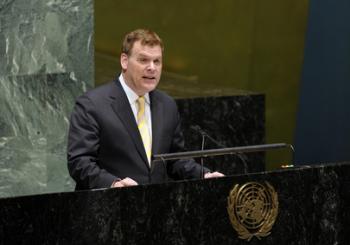Change the conversation, support rabble.ca today.
On December 10th, the world celebrated Human Rights Day. Of course, I didn’t expect this celebration to be a joyful or a rosy one. Canada, with the trembling voice of its Foreign Affairs Minister John Baird, added its fading voice to the international scene.
In his press release, Baird reminded us of Malala Yousfai, the Pakistani teenager who was shot by the Taliban, of the religious persecution of minorities in Iran, of political prisoners in North Korea, and of political activists in Hong Kong. As a human rights activist, I didn’t expect Baird to raise all cases of abuses, human rights violations and injustices. This is simply impossible. Nevertheless, as a Canadian, I would assume that his press release would show more subtleties, courage and admit some mea culpa. Clearly, I was dreaming, as I would be ignoring the strong ideology tainting the Conservative government and its highly partisan approach to politics.
How can we give human rights lessons to the world when we don’t clean our own backyard at home? What international credibility does Canada still have after losing its seat at the UN’s Security Council? To whom was Mr. Baird directing his message? To his own circle of “friends,” or to all Canadians?
While Mr. Baird was proclaiming that “the promotion and protection of human rights is a cornerstone of our principled foreign policy,” he forgot to mention the case of the child soldier Omar Khadr who spent eight years of his life in Guantanamo, and his ongoing detention now in Canada. Perhaps also, someone needs to remind him of the three Muslim men who were detained in the same facility where Omar Khadr is incarcerated today. Mohamed Harkat, Mahmoud Jabalah and Mohamed Mahjoub, three of whom have been facing secret evidence in a scenario where they will never know the evidence against them let alone be able to challenge it. Their right to due process, a concept which seems to be very cherished by Mr. Baird in his press release, isn’t recognized. They face deportation to torture and their families have gone through tremendous injustice and lack of moral and financial support.
Interestingly enough, the case of Mohamed Mahjoub, who calls himself a political prisoner, is an astonishing one. Very recently, Egyptian courts overturned a military tribunal conviction against him from the Mubarak era that was for a long time the centrepiece of the case against him in Canada. One of the arguments the Egyptian tribunal relied on in their decision was that the information had been obtained through torture. The irony of the situation is that Canada admitted in 2010 to using information provided through torture, and Egypt, the same country from which the information emerged, is now showing the way to Canada.
While preaching from a virtual pedestal and looking far abroad to Iranians and to North Koreans, Mr. Baird seems to have forgotten to look closer home, at the cases of missing aboriginal women in Canada. Maybe he didn’t want to mention the case of Theresa Spence, the Chief of Attawapiskat who on December 11 went on an indefinite hunger strike, demanding justice and respect for her people and for all First Nations in Canada. Unfortunately, the images and stories about the poverty and insalubrities her community live in became the symbol of how our First Nations are treated in Canada.
Canada has a long way to go to gain a place as a champion of human rights. Mr. Baird’s vision is blurred and certainly lacks coherence. Looking closer home is a starting point.
Monia Mazigh was born and raised in Tunisia and immigrated to Canada in 1991. Mazigh was catapulted onto the public stage in 2002 when her husband, Maher Arar, was deported to Syria where he was tortured and held without charge for over a year. She campaigned tirelessly for his release. Mazigh holds a PhD in finance from McGill University. In 2008, she published a memoir, Hope and Despair, about her pursuit of justice, and in 2011, a novel in French, Miroirs et mirages.



